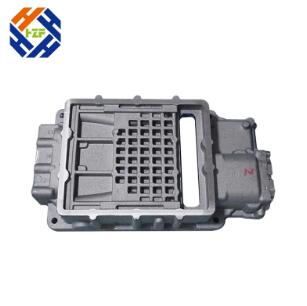Understanding the Importance of Aluminum Casting in Engine Covers
2024-09-02
The engine cover plays a crucial role in the overall functionality and performance of a vehicle. It’s not just a protective shield; it also contributes to the engine's efficiency, noise reduction, and durability. Among the various materials used in manufacturing engine covers, aluminum casting stands out for its exceptional properties. This blog will delve into the significance of aluminum casting in engine covers, exploring why it's a preferred choice in the automotive industry.
Why Aluminum Casting?
1. Lightweight Yet Strong
- Weight Reduction: One of the primary advantages of using aluminum casting for engine covers is its lightweight nature. Reducing the weight of engine components contributes to better fuel efficiency and overall vehicle performance. Aluminum is significantly lighter than other metals like steel, making it an ideal choice for automotive applications where weight reduction is crucial.
- Strength and Durability: Despite being lightweight, aluminum offers excellent strength and durability. When cast, it forms a robust and resilient engine cover that can withstand the harsh conditions under the hood, including high temperatures and mechanical stresses.
2. Heat Resistance and Thermal Conductivity
- Efficient Heat Dissipation: Aluminum is known for its superior thermal conductivity, which allows it to dissipate heat effectively. This property is particularly beneficial in engine covers, as it helps in managing the heat generated by the engine, thereby preventing overheating and enhancing the engine’s longevity.
- Temperature Stability: Aluminum casting can withstand high temperatures without deforming, ensuring that the engine cover maintains its integrity under extreme conditions. This stability is essential for maintaining engine performance and reliability.
3. Corrosion Resistance
- Long-Lasting Protection: Aluminum has natural corrosion-resistant properties, making it ideal for engine covers that are constantly exposed to moisture, oil, and other corrosive elements. An aluminum-cast engine cover provides long-lasting protection to the engine components, reducing the risk of corrosion-related damage.
- Low Maintenance: The corrosion resistance of aluminum reduces the need for frequent maintenance or replacement of engine covers, offering cost savings over the vehicle’s lifespan.
4. Design Flexibility and Precision
- Complex Geometries: The casting process allows for the creation of complex and intricate designs that would be difficult to achieve with other manufacturing methods. This flexibility is particularly important in engine covers, where precise fitting and integration with other components are required.
- Customizability: Aluminum casting enables manufacturers to customize engine covers according to specific engine designs, ensuring optimal performance and compatibility.
5. Sustainability
- Recyclability: Aluminum is highly recyclable, making it an environmentally friendly material choice. Engine covers made from aluminum casting can be recycled at the end of their life cycle, contributing to sustainability efforts in the automotive industry.
- Energy Efficiency: The energy required to recycle aluminum is significantly lower than that needed to produce new aluminum from raw materials, further enhancing the environmental benefits of using aluminum casting.
Applications in the Automotive Industry
Aluminum casting is widely used in the production of various engine components, with engine covers being one of the most common applications. Its use is prevalent in both traditional internal combustion engines and electric vehicles, highlighting its versatility and importance in modern automotive engineering.
- Internal Combustion Engines: In traditional engines, aluminum-cast engine covers help manage the heat produced during combustion and protect vital engine components from external damage.
- Electric Vehicles: As the automotive industry shifts towards electric vehicles (EVs), aluminum casting continues to play a key role. In EVs, aluminum engine covers are used to protect electric motors and battery packs, benefiting from the material’s lightweight and heat-dissipating properties.
Conclusion
Aluminum casting has revolutionized the design and production of engine covers, offering a combination of lightweight, strength, heat resistance, and corrosion resistance. Its flexibility in design and sustainability make it a preferred choice for automotive manufacturers aiming to enhance vehicle performance and efficiency. Whether in traditional engines or modern electric vehicles, aluminum-cast engine covers continue to be a critical component, ensuring engines run smoothly and efficiently for years to come.



